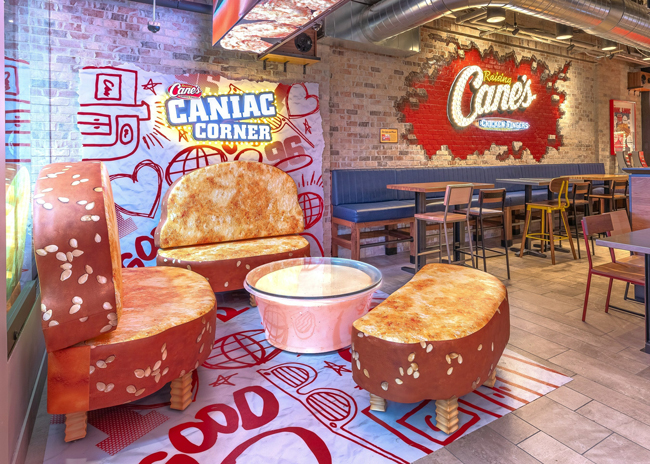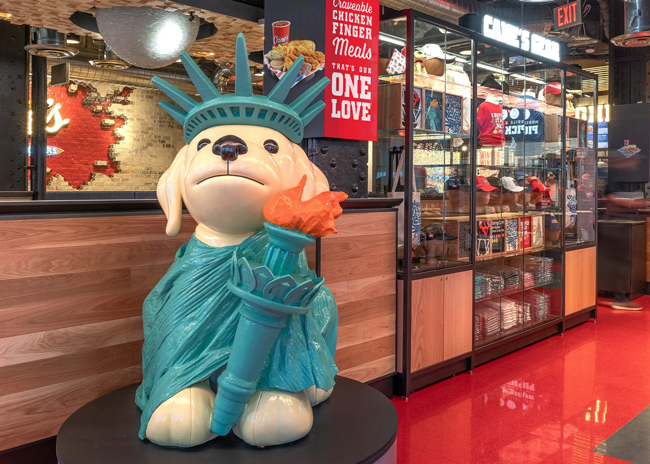Pizza ovens come under fire. Another restaurant chain opens a flagship location in Times Square, while two chains look overseas for innovation and inspiration. Plus, even more tech talk.
Restaurant companies continue to tinker with new and emerging forms of technology, testing everything from artificial intelligence to robotics. And they do so with good reason as there’s no denying the potential positive impact technologies such as artificial intelligence can have on the foodservice industry. One study suggests the use of voice-enabled artificial intelligence in drive thrus can increase sales by as much as 15% and cut 10 seconds off the service time, as CNBC reports. Potentially, this could allow operators to make more effective and efficient use of what labor they do have.
Still, it’s interesting to note while the number of companies testing these various forms of technology continues to grow, widespread adoption of these technologies continues to lag. So what’s the deal?
That’s a question I posed to a quartet of foodservice pros during FE&S 2023 Consultants Roundtable webcast. The short answer: it’s still pretty complicated. Operators will require stronger proof of concept and a return on investment that makes sense in their unique business environments before widespread adoption occurs. (For more on what these FCSI member consultants had to say about various industry trends including how to address labor challenges through design and equipment, the impact of smaller footprints and more, be sure to read this story from the June issue of FE&S.)
In addition, a study by the Food Institute suggests that the AI will have on the industry may not the impact many originally anticipated. Rather than displacing frontline workers, AI could have a greater impact on middle managers.
As the restaurant industry continues to slowly emerge from the effects of the COVID-19 pandemic (more on that below), it’s easy to want to swing for the fences to spark growth and improve margins. But given the still uneven economic climate perhaps playing small ball, which in this case means looking for incremental opportunities to drive efficiency makes more sense, at least for a little while longer.
 Raising Cane's opened an 8,000-square-foot flagship location in New York City’s Times Square. Image courtesy of Raising Cane's.
Raising Cane's opened an 8,000-square-foot flagship location in New York City’s Times Square. Image courtesy of Raising Cane's.
Foodservice News This Week
- Is the foodservice industry suffering from its own version of long COVID? Perhaps. While construction bids have stabilized, permitting and equipment timelines continue to hamper some operators’ ability to open new restaurants in a timely manner. Take, for example, the multiconcept operator Darden. Rick Cardenas, the company’s CEO, said these kinds of delays continue to impact its ability to reach its development goals, per a story by FSR. “It would be great if we could get permits as fast as we used to get them. It would be great if we can get utilities turned on as fast as we used to get them,” Cardenas said during Darden's Q4 earnings call. “That just has not come back anywhere near where we need it to be.”
- Coal- and wood-fired pizza ovens have come under fire in New York City. The New York City Department of Environmental Protection has drafted new rules that would order foodservice operators that are using this decades-old baking method to slice carbon emissions by up to 75%, per a story in the New York Post. The rule could require pizzerias with such ovens installed prior to May 2016 to buy emission-control devices. The owner of one Brooklyn pizzeria said he’s already paid $20,000 on an air filter system in anticipation of the new mandate.
- A franchisee for quick-service chain Zaxby’s has opened an off-premises-only unit in Hoover, Ala. The 2,000-square-foot unit represents Zaxby’s newest prototype design for a to-go-only restaurant, per a company release. The building’s footprint is roughly two-thirds the size of a traditional Zaxby’s location. It includes a walk-up window for guests to place to-go orders and an outdoor patio with four tables, but no dine-in seating. Birmingham-based Vincent Construction, Inc. was responsible for the construction of the new restaurant.
- Multiconcept operator Inspire Brands opened an innovation center in India. Through Inspire Brands’ Hyderabad location the company seeks to build its capabilities in such areas as data engineering, data science and analytics, eCommerce, AI, platform engineering and automation. This location will also feature an innovation lab, through which Inspire will work with local start-ups to develop new solutions across key business areas. Inspire has hired nearly 100 team members to date in Hyderabad.
- Starbucks plans to develop a sustainability learning and innovation lab at Hacienda Alsacia – the company’s global agronomy headquarters for research and development, located in Costa Rica. The lab will serve as a hub for hands-on and virtual learning opportunities for Starbucks employees, students, researchers and industry leaders to innovate and scale sustainable solutions for challenging environmental and social issues, including climate adaptation and agricultural economics. Starting this fall, the lab will offer the first wave of educational programming to select Arizona State University students and Starbucks partners.
 The beloved yellow lab mascot of Raising Cane's. Image courtesy of Raising Cane'sRaising Cane's opened a flagship location in New York City’s Times Square. The 8,000-square-foot restaurant features a custom mural painted live by New York-based artist Timothy Goodman, custom design elements for the New York City Market and many nods to its namesake and mascot, the beloved yellow lab Cane.
The beloved yellow lab mascot of Raising Cane's. Image courtesy of Raising Cane'sRaising Cane's opened a flagship location in New York City’s Times Square. The 8,000-square-foot restaurant features a custom mural painted live by New York-based artist Timothy Goodman, custom design elements for the New York City Market and many nods to its namesake and mascot, the beloved yellow lab Cane.- Growth Chains: Oregon-based Black Rock Coffee Bar continues to grow its Texas presence by opening a location in Spring, which is in the Houston area. Black Rock has a total of 23 units systemwide in Texas. The coffee chain also opened a location in Meridian, Idaho, its sixth in the Boise market. Fast-casual Indian chain Curry Up Now will enter the North Carolina market with the opening of two locations. The chain plans to open its Durham, N.C., location later this summer. And Curry Up Now plans to open a unit in Chapel Hill, N.C., before the end of the year. International Dairy Queen plans to open 180 locations in China by 2034. The chain will work with its wholly-owned subsidiary to accomplish this development goal. Fatburger opened a location in Riverview, Fla., its first in the Sunshine State in approximately 20 years, per the company. The chain plans to open three additional locations in the Tampa market over the next five years and ten locations in Orlando over the next seven years. The Habit Burger Grill partnered with HMSHost to open a restaurant in Chongqing, China. The restaurant is located at Terminal 3 in Chongqing Jiangbei International Airport. Salad and Go opened two Texas locations, one in Hurst and another in Little Elm, bringing the chain to 50 units in the Lone Star State. Full-service breakfast, brunch and lunch concept Toasted Yolk opened a location in Biloxi, Miss.
Economic News This Week
- Initial unemployment claims totaled 264,000 for the week ending June 17, per the U.S. Department of Labor. This is unchanged from the previous week's revised level. The 4-week moving average was 255,750, an increase of 8,500. This is the highest level for this average since November 13, 2021, when it was 260,000. The fact that jobless claims have been elevated for three straight weeks as some economists believe the job market is finally starting to soften, per a Reuters report.
- Sales of new single‐family houses came in at 763,000 in May 2023, per data from the U.S. Census Bureau. This is 12.2% more than in April and 20.0% more than in May 2022. The median sales price of new houses sold in May 2023 was $416,300. The average sales price was $487,300. The seasonally adjusted estimate of new houses for sale at the end of May was 428,000, which represents a supply of 6.7 months of homes for sale at the current sales rate. Buyers seem to favor new construction compared to existing homes, per various published reports like this one from CNN.
- Sales of existing homes increased 0.2% in May compared to the previous months, per the National Association of Realtors. Despite this modest gain, home sales declined 20.4% from the same period in 2022. The inventory of unsold existing homes grew 3.8% from the previous month to 1.08 million at the end of May, or the equivalent of 3.0 months' supply at the current monthly sales pace. Sales were mixed among the four major U.S. regions, with the South and West posting improvements and the Northeast and Midwest experiencing pullbacks. All four regions experienced year-over-year sales declines.
- New orders for manufactured durable goods increased 1.7% in May, per data from the U.S. Census Bureau. This represents the third consecutive monthly increase for durable goods orders and comes on the heels of a 1.2% April increase. Excluding transportation, new orders increased 0.6%. Excluding defense, new orders increased 3.0%. Transportation equipment, also up three consecutive months, led the increase growing by 3.9%. Further, May’s numbers exceeded expectations, as economists polled by the Wall Street Journal had projected a 0.9% decline in durable goods orders for the month. Still, not everyone is celebrating. Per a Market Watch report, some feel manufacturing may have its bottom but is not quite ready for a full-scale rebound.
Editor’s note: Thanks for reading This Week in Foodservice. In honor of the July 4 holiday, we will skip next week’s blog and return on July 12.



